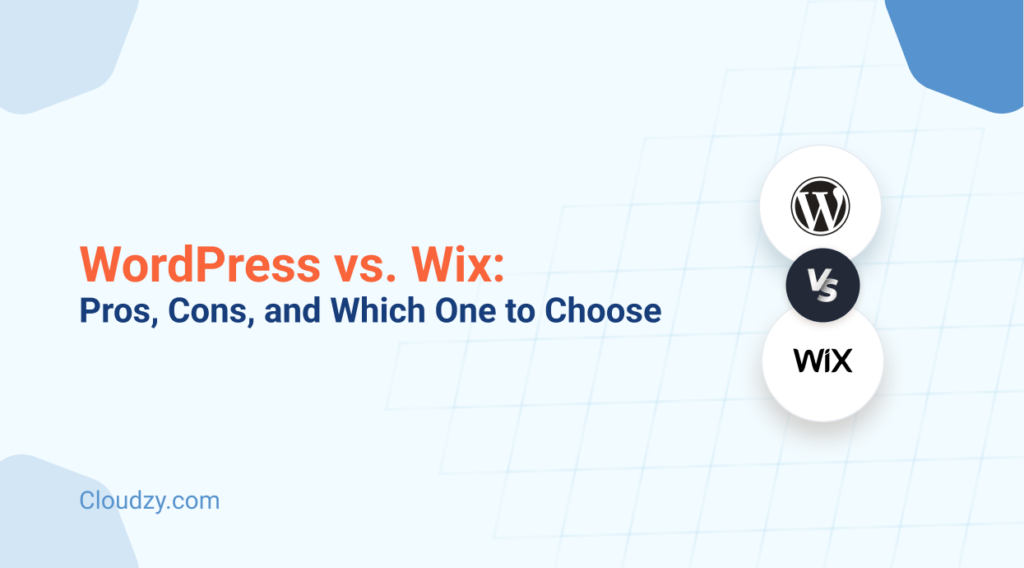Choosing between WordPress and Wix for building your website isn’t a decision to be taken lightly. Both have strong followings, but they appeal to different types of users. WordPress has endless customization but a steep learning curve. Meanwhile, Wix provides an easy drag-and-drop setup but ma
y give you less control. Well, let’s break it down and see which one might be a better fit for you.
Wix and WordPress: Differences and Similarities
You’ll hear a lot about how WordPress and Wix differ, but what about the areas where they’re the same? Here’s a simple rundown of how these two platforms stack up.
What is Wix?
Wix is an online platform where you can quickly create a website with minimal effort. It’s designed for people who want a simple solution, and over 800,000 live stores utilize it. The drag-and-drop interface means you don’t need to know any coding. Plus, there’s a whole library of templates to help you build a beautiful site, whether you’re creating a blog, an online store, or a personal portfolio. Wix is particularly great for small businesses and personal websites, as it bundles everything together—hosting, design, and even marketing tools—making it super convenient.
What is WordPress?
WordPress is more like a powerful tool for people who want complete control over their site, powering over 43% of all websites on the internet. It’s an open-source content management system (CMS) that huge companies and bloggers use. So, understanding the fundamentals of web hosting will help you make the best choice when setting up your WordPress site. This platform is known for being incredibly flexible, but with that flexibility comes a lot more work. You’ll need to handle hosting, domain registration, and themes on your own. It’s best for people who have some technical know-how or are willing to learn the ropes. If you want to customize things beyond what’s possible on Wix, WordPress has you covered—but you’ll have to put in the effort.
Features of Wix vs WordPress
| Feature | Wix | WordPress |
| Ease of Use | Super simple, drag-and-drop | Requires more effort and tech skills |
| Design Flexibility | Limited customization options | Full control over design, if you’re tech-savvy |
| Templates/Themes | 900+ pre-designed templates | Thousands of free and premium themes |
| Plugins/Apps | Limited to Wix’s app marketplace | Thousands of plugins for added functionality |
| eCommerce | Basic eCommerce features | Advanced eCommerce with WooCommerce |
| SEO Capabilities | Built-in SEO tools, but less control | Full control with plugins like Yoast |
| Customer Support | 24/7 live chat and phone support | Community-based support, no direct help |
| Pricing | Starts at $17/month | Free (self-hosted); paid hosting required |
| Hosting | Included in plans | Separate hosting needed |
Design Flexibility: Wix vs WordPress
Wix is definitely designed to make things simple for users. When it comes to design, it’s all about templates and drag-and-drop ease. While Wix offers plenty of stunning templates (over 900, in fact), its customization options are more limited compared to WordPress. Once you select a template, you’re committed to it. Sure, you can adjust the content, images, and colors, but switching to a completely new template means starting over.
WordPress, on the other hand, provides much more freedom. Not only can you choose from thousands of themes, but you can also tweak them as much as you like. WordPress lets you play with the code if needed, and with page builders like Elementor, designing without coding knowledge has become much easier. The real power lies in the ability to swap out themes at any time. This is huge if you decide your website needs a major redesign down the line.
Winner: WordPress earns the crown here for those who want maximum design flexibility. Wix is more user-friendly but can feel a bit limiting once you get into the specifics.
eCommerce Capabilities: Wix vs WordPress
If you’re looking to sell online, both Wix and WordPress can help you set up shop—but they do it in different ways. Wix offers essential e-commerce features that are suitable for smaller stores. You can easily add a store to your site, accept payments, and manage inventory. Wix even includes options like creating discounts and abandoned cart emails. Everything is in one place, and it’s very easy to set up.
WordPress, however, gives you a more powerful option with its popular WooCommerce plugin, which is utilized by millions of e-commerce sites worldwide.
While Wix covers the basics well, WordPress shines if you’re planning on scaling or need complex functionality. The downside is that it’s not as simple to use, and you might have to juggle a few more plugins to get everything working.
Winner: WordPress is the go-to for serious eCommerce websites. Wix is great for small stores or anyone who needs to get started quickly with a simple setup.
SEO Tools: Wix vs WordPress
When it comes to SEO (search engine optimization), both platforms provide solid tools to help your site get found by search engines. But WordPress has the upper hand here with its plugin options.
Wix has a built-in SEO tool that guides you through the basics like editing meta tags, adding alt text to images, and optimizing your URLs. It’s straightforward and user-friendly and great for beginners who don’t want to get bogged down in the technical details. Wix also has a helpful SEO checklist that shows you what to improve for better rankings.
But if you’re more serious about SEO, WordPress with plugins like Yoast SEO takes it to the next level. Yoast allows you to manage meta descriptions, create XML sitemaps, and optimize for specific keywords in real-time as you write your posts. It gives you control over how your content is structured for search engines and provides feedback on improving your content’s SEO. You can also install other plugins to further improve performance, like WP Rocket for caching, which makes your site faster.
Winner: WordPress has the edge for SEO. Wix is good for beginners but WordPress gives you more advanced options for SEO success.
Customer Support: Wix vs WordPress
Support is another area where Wix and WordPress differ significantly. Wix shines here with its 24/7 live chat support, phone support, and a rich help center full of tutorials and guides. They make it really easy to get help whenever you run into a problem, and their team is responsive and helpful. This can be a lifesaver if you’re not the tech-savvy type and don’t want to figure out issues on your own.
On the flip side, WordPress doesn’t offer direct support. If you run into an issue, you’re mostly on your own. Fortunately, there’s a huge WordPress community that’s more than willing to help. You can find answers on forums, in tutorials, and even from WordPress developers. But that doesn’t make it easy, especially when trying to fix a problem quickly. Plus, if you’re using third-party themes or plugins, you may have to go through their respective support channels for help.
Winner: Wix wins for customer support, hands down. WordPress is a bit of a DIY situation, though the community is strong if you’re willing to dig around.
Pricing: Wix vs WordPress
Pricing is another important factor, and this is where things get a little tricky because it depends on what you’re after.
With Wix, everything is included in the pricing plan: hosting, design, security, and customer support. Plans start at $17 per month for the basic features and go up to $159 per month for their most premium plan. The higher-end plans unlock more features like advanced eCommerce capabilities and increased storage. Wix’s all-in-one pricing structure is straightforward, and you don’t have to worry about additional costs for hosting or plugins.
WordPress itself is free to use, but you’ll need to pay for hosting (starting at $5 per month for basic hosting), a domain name, and premium themes or plugins. These costs can add up depending on what you’re looking to do. If you want managed hosting (which makes WordPress much easier to use), you’re looking at $20–$30 per month or more. You’ll also likely need some paid plugins, especially for things like eCommerce, SEO, or advanced security. If you’re on a tight budget, WordPress can still be affordable, but it requires more ongoing attention to manage the costs.
Winner: Wix is more predictable and includes everything in one plan. WordPress might be cheaper upfront, but costs can increase over time depending on the features you need.
Pros and Cons of Wix
Pros:
- Ease of Use: Wix is perfect if you’re looking for a website up and running quickly. Its drag-and-drop functionality is hard to beat for beginners.
- All-in-One Solution: Wix covers everything from hosting to security and updates, so you don’t have to worry about those technical details.
- AI Tools: Wix ADI can even help you build your site with minimal effort. It’s like having a personal assistant walk you through the whole process.
Cons:
- Limited Design Flexibility: Once you pick a template, that’s pretty much it. You can’t switch templates without starting over.
- Not Ideal for Larger Sites: If your website is going to grow or handle lots of traffic, Wix may not be able to keep up.
- Limited Plugin Options: Wix’s app marketplace is nothing compared to WordPress’s extensive plugin library. You might feel restricted in terms of functionality.
Pros and Cons of WordPress
Pros:
- Full Customization: If you know what you’re doing, WordPress gives you complete control over every aspect of your website.
- Plugins Galore: With thousands of plugins to choose from, you can add almost any feature you need. From advanced SEO tools to eCommerce and security, WordPress has it all.
- Scalability: WordPress works well for large websites. If your site grows, it can handle that growth without issues.
Cons:
- Steep Learning Curve: WordPress isn’t as beginner-friendly as Wix. If you’re new to website building, expect a bit of a learning curve.
- Ongoing Maintenance: You’ll need to manually update your plugins and themes, and occasionally troubleshoot issues as they arise.
- Security Risks: WordPress is a common target for hackers. Regular updates and security plugins are a must.
Which Platform Is Easier to Build a Website With?
When it comes to ease of use, Wix is the clear winner. Here’s why.
- Wix’s Ease of Use: Wix is perfect for those who want to get their site up and running quickly. Its drag-and-drop functionality means you don’t need any technical skills. Whether you’re adding images, text, or even a contact form, it’s all incredibly easy. You also get AI-powered tools like Wix ADI, which helps you build a site in minutes by asking a few simple questions.
- Templates and Customization: Wix offers over 900 templates, each tailored for different types of websites. The templates are easy to edit; if you don’t like one, you can swap it out for another with just a few clicks.
WordPress, on the other hand, is a little trickier.
- WordPress Setup: Setting up a WordPress website can feel like a puzzle. You need to handle hosting, install WordPress, and find a theme. Sure, some hosts offer one-click WordPress installations, but that doesn’t mean you won’t run into issues along the way. WordPress is powerful, but it requires some learning to get everything just right. You can also consider installing WordPress on VPS for better stability.
- Plugin Management: WordPress uses plugins for almost everything. That means there are a lot of options, but they can also feel overwhelming if you’re not familiar with them.
In short, if you’re just starting out and want something simple, Wix is your best bet. If you have a bit of tech know-how (or you’re willing to learn), WordPress offers more customization options.
Conclusion: Which One Should You Choose?
Choosing between Wix and WordPress really depends on your needs. If you want something quick and easy, Wix is the way to go with its user-friendly setup and all-in-one pricing. But if you’re looking for full control and the flexibility to grow, WordPress is the better choice, especially if you’re comfortable with a bit more complexity. Both are great; it just comes down to what fits your project best.
 Windows VPS Hosting
Windows VPS Hosting
Check out our affordable Windows VPS plans, featuring powerful hardware, minimal latency, and a free Windows of your choice!
Claim your Free WindowsFAQ
1. Can I switch templates in Wix?
Once you pick a template, you’re stuck with it—at least for that website. If you want to switch to a different one, you’ll need to rebuild your site.
2. Is WordPress good for beginners?
It can be, but it’s not as straightforward as Wix. There are plenty of tools (like Elementor) that can help simplify the process, but it does require some learning.
3. Which platform is better for SEO?
WordPress takes the lead here, mainly because it gives you more control. With plugins like Yoast, you can really fine-tune your site’s SEO. Wix is easier for beginners but doesn’t offer the same level of control.
4. Which platform is better for eCommerce?
If you’re starting small, Wix is fine for basic stores. But if you plan to scale or need more advanced features, WordPress with WooCommerce is the way to go.
5. Is WordPress free?
Technically, yes. WordPress itself is free, but you’ll need to pay for hosting, a domain, and potentially premium themes or plugins.



